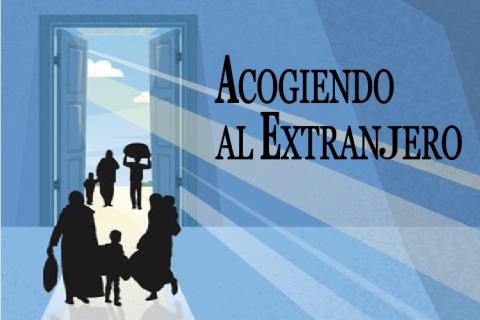
Visit to Mount Cristo Rey in New Mexico to bring water to migrants crossing this dangerous natural border into the U.S. (Courtesy of Leticia Gutiérrez Valderrama)
Editor's note: Global Sisters Report's Welcoming the Stranger series takes a closer look at women religious working with immigrants and migrants. The installments feature Sisters and organizations that network in order to better serve persons crossing the border, explore global migration trends, and have the issue of immigration addressed in the wake of the recent U.S. presidential election.

I arrived in the Diocese of El Paso, Texas, in the United States two months ago. However, as Missionaries of St. Charles Borromeo Scalabrinians, we have been present here since April of this year, through Sister Elisete Signor and Sister Roschell, who "stayed for one month, accompanying the new mission." This marked the start of our Scalabrinian presence with our brothers and sisters who migrate across this border.
We are here to take on the new pastoral ministry launched by the diocese this year: the Migrant Hospitality Ministry, for which I currently serve as the executive director.
I begin with this background to set the context for our reflection on the presence of the people who migrate, and on "God who walks with his people." The scenario includes two places where our brothers and sisters in human migration cross borders irregularly: the mountain of Cristo Rey and the Santa Teresa desert in Las Cruces, New Mexico in the United States. Both areas border Ciudad Juárez, Mexico.
Those who cross the border into the U.S. illegally rarely do so by choice. They do so because migration policies and management increasingly reduce the possibilities to migrate legally through safe places and at official ports of entry, not only on this border of the world, but also globally, including in regions like the European Union.
Going to the mountains and the desert has a reason: More than 170 brothers and sisters have died in this border area.
Going to the mountains and the desert through the Migrant Hospitality Ministry, in communion with Hope Border Institute and some parishes of our diocese, has a reason: More than 170 brothers and sisters have died in this border area. Hope Border Institute initiated the "Drops of Water" mission to save lives in what is essentially the backyard of our diocese — our home.
Migrants have died due to extreme temperatures in this region, and because they are abandoned by human traffickers who leave behind those who are injured, dehydrated, disoriented or unable to continue. They are simply left to die unless someone finds them.
Carrying water three times a week has become our expression of a "church on the move" — a church that wants to walk with its people. We seek to go out to meet them, leaving water to preserve the lives of those who are forced to cross these dangerous routes. Additionally, we also look for people who may be injured, abandoned or possibly already dead.
In a place where everything speaks of life, of stories, of specific people, of necropolitics and a life behind a wall, we seek to be close and walk there with them. This and more are what the desert and the mountains represent: theological places where God reveals himself, manifests himself, draws near and reminds us that we are in sacred places.
This is what I sensed from the first day I journeyed on Mount Cristo Rey. The more we walked, the more I found backpacks, women's purses, clothes, belts, passports or identity cards. I realized they weren't trash, but belongings of people with stories — people who have lived through countless experiences in their countries of origin or place of residence.
Advertisement
Other borders I have had the opportunity to visit or walk through came to my mind, but, above all, I was reminded of the dense jungle route of the Darién Gap. That borderland between Panama and Colombia, over the past decade, has become an important route for people escaping from hunger, war, and political and social crises, driving them to seek refuge continentally or internationally.
Those borders that are so close and familiar to me, resurfaced vividly the moment I came across personal items, both in the mountains and in the desert. I wondered: Who was this person? Where did they come from? Did they cross the Darién? How was their journey through Mexico? Were they kidnapped? Was a ransom paid for their release? How are they now — physically and psychologically?
Many questions remain unanswered; I simply empathized with that person, whose belongings revealed to me the plight of migrants, who are not only victims of violence but also prophets of our time. They denounce the injustices of this economic, political and social system. Migrant people continue to be victims of the selective migration policies and governance imposed by the governments of the global north.
Yet, their presence is also a source of hope, as they stir in us indignation in the face of violence and violations of their human rights. They remind us that when their humanity is violated, our own humanity is also affronted and we no longer wish to tolerate such violence.
That is why, here in El Paso and in many regions of the world, we are committed to humanizing their transit, defending their human rights, and advocating for change to these inhumane policies. Through gestures of welcome, hospitality and humanity — like bringing water to the mountains and desert — we create a revolutionary action of compassion and humanization. In doing so, we stand in opposition to those who divide, traffic and objectify.
This article was originally published in Spanish on Nov. 8, 2024.













